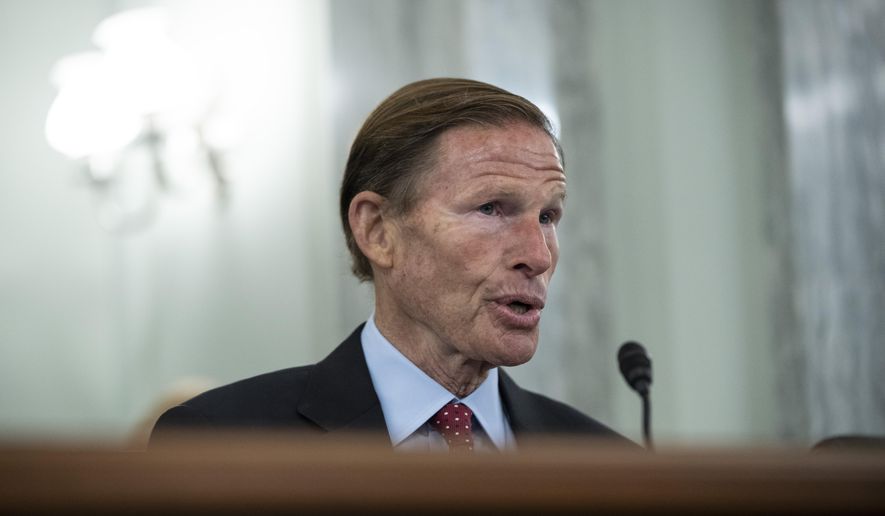Facebook is no longer the only social media company in Congress’ crosshairs for potentially causing harm to America’s children.
Executives from Snapchat and TikTok made their first appearances before Congress on Tuesday, entering a new stage in the threatened crackdown on tech from lawmakers.
Sen. Richard Blumenthal, Connecticut Democrat, argued that teenage insecurity, hate and anxiety are exacerbated by tech platforms looking to hook kids on their products. He told representatives from Snapchat, TikTok and YouTube that they could not avoid lawmakers’ ire by simply not being Facebook.
“I understand from your testimony that your defense is ‘we’re not Facebook, we’re different, and we’re different from each other.’ Being different from Facebook is not a defense,” Mr. Blumenthal said at a hearing before the Senate Commerce Committee’s subcommittee on consumer protection and data security. “That bar is in the gutter. It’s not a defense to say that you are different.”
The tech platform executives sought to distance themselves from the social media industry at large, with Snap Inc. Vice President Jennifer Stout informing lawmakers that her platform describes itself as a “camera company.”
In her testimony, Ms. Stout insisted that her company was different from other tech platforms that sparked anger among lawmakers.
“Snapchat was built as an antidote to social media,” she said.
But lawmakers painted a different picture through their own experiences on various platforms. Sen. Mike Lee, Utah Republican, said his staffers created a Snapchat account posing as a young teenager and were soon bombarded with inappropriate content including an “invite to play an online sexualized video game” and articles about “porn stars,” among other things.
Ms. Stout said she was “unfamiliar” with the content shown to his fake account but stressed that content promoted within Snapchat is not hurtful or illegal.
Details about which advertisers were responsible for the content Mr. Lee’s team saw and whether other digital activity may have yielded targeted content were not immediately clear.
TikTok similarly faced accusations that it enabled dangerous behavior from teenagers. Sen. Marsha Blackburn, Tennessee Republican, said lawmakers have allowed social media platforms to promote and glorify dangerous content for teens.
“Kids as young as nine have died doing viral challenges on TikTok and we’ve seen teen girls lured into inappropriate sexual relationships with predators on Snapchat,” she said. “You’re parents, how can you allow this?”
Similar to Snapchat, TikTok sought to distance itself from other prominent social media platforms like Facebook that focus on people’s relationships with others.
“TikTok is not a social network based on followers or social graph,” said Michael Beckerman, TikTok vice president. “It’s not an app that people check to see what their friends are doing. You watch TikToks. You create on TikTok.”
Lawmakers also raised concerns about who is watching over Americans’ data on TikTok, particularly kids’ information. Sen. Ted Cruz, Texas Republican, repeatedly pressed Mr. Beckerman for information about whether TikTok’s fine print gives the Chinese Communist Party access to Americans’ data.
Mr. Beckerman accused Mr. Cruz of asking “gotcha questions” and Mr. Cruz said Mr. Beckerman was behaving as someone “hiding something.”
While the lawmakers applied pressure to the tech platform executives, a consensus has yet to emerge about a single legislative fix. Mr. Blumenthal, who leads the subcommittee, said parents should not be the only ones in charge of their kids’ experiences online.
“All of this research and facts and disclosures sent a message to America’s parents: You cannot trust Big Tech with your kids. The parents of America cannot trust these apps with their children,” he said. “And Big Tech cannot say to parents, ‘You must be the gatekeepers. You must be the social media copilots. You must be the app police.’ Because parents should not have to bear that burden alone.”
Mr. Blumenthal said he wanted “stronger rules” to protect kids and “real transparency, real accountability” from the tech platforms.
• Ryan Lovelace can be reached at rlovelace@washingtontimes.com.




Please read our comment policy before commenting.